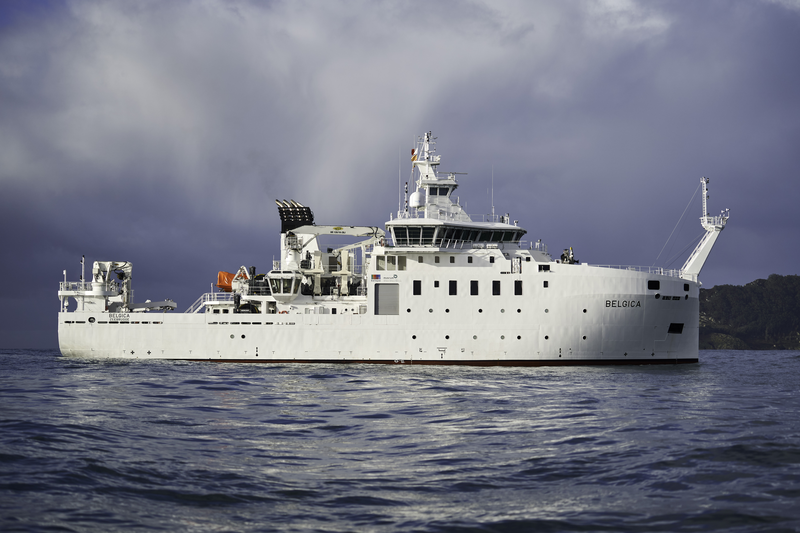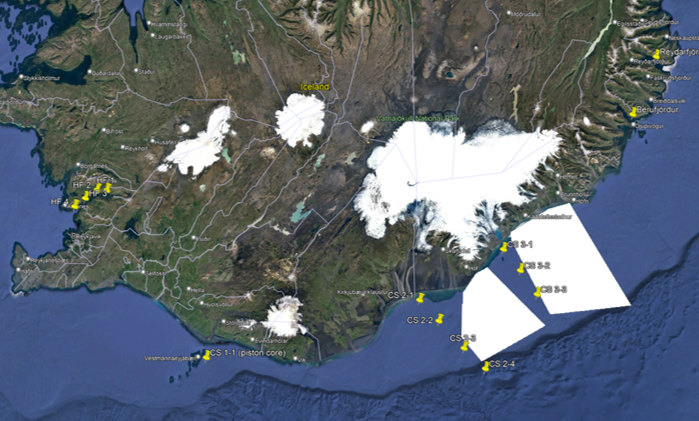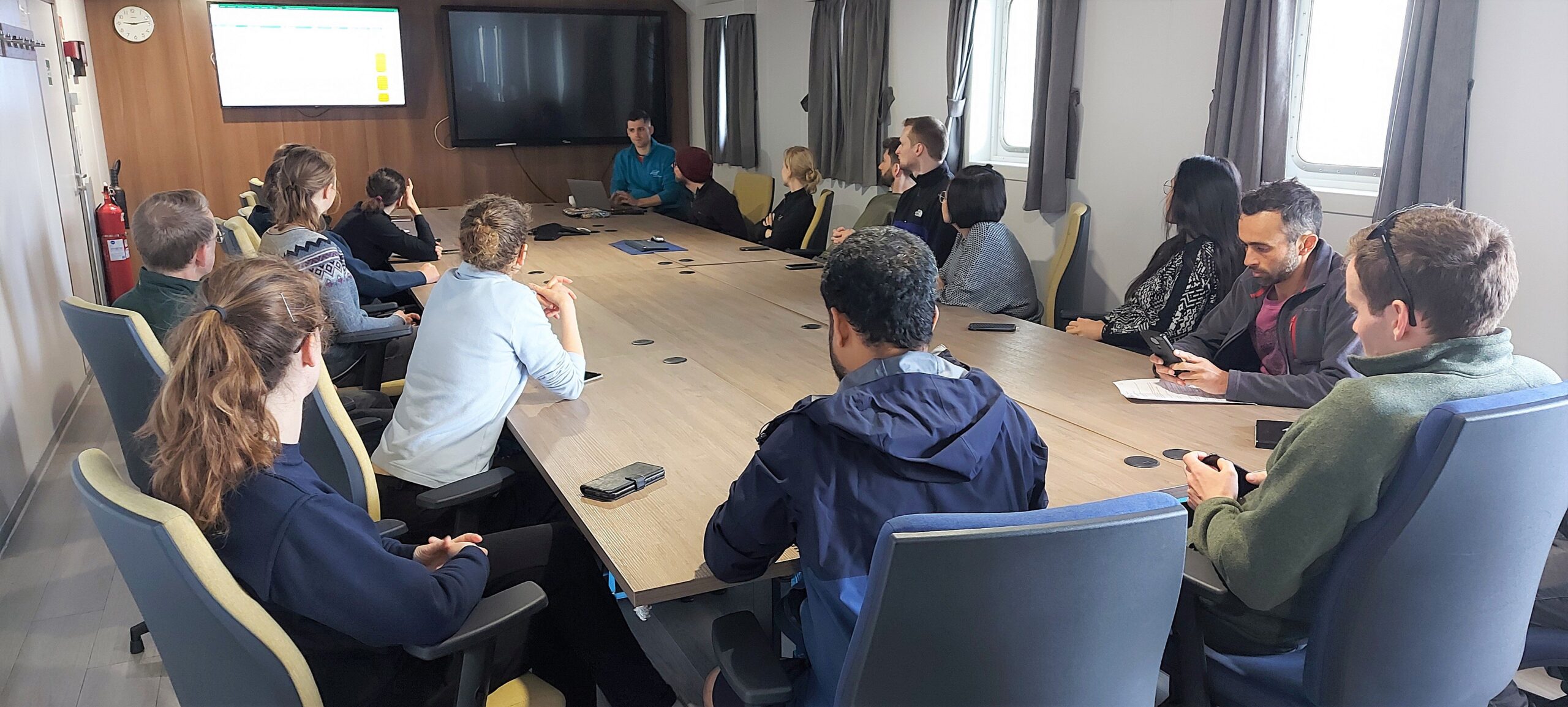First RV Belgica Mission to the Far North
On 26 June 2023, an international team of scientists embarked on the first arctic mission of the new Belgian oceanographic research vessel RV Belgica. They boarded in the Icelandic capital Reykjavik and will spend 16 days in the fjords and on the continental shelf of Iceland investigating the possibilities of reducing the concentration of atmospheric carbon dioxide by enhancing the weathering of silicates in the ocean. This process has potential to contribute to the active mitigation of the ongoing global warming.

Climate change is one of the biggest global challenges of the 21st century and urgently requires ambitious, transformative, and collective action to limit global warming. In 2015, representatives from 196 countries gathered at the United Nations Climate Change Conference in Paris and signed a historic agreement to limit the increase in global average temperature to below 2 degrees Celsius compared to pre-industrial levels.
Meanwhile, however, emissions of carbon dioxide (CO2) still continue to rise and have reached atmospheric concentrations that are unprecedented in at least the last 800.000 years. Humanity is now at the point where preventing emissions of carbon dioxide and other greenhouse gases to the atmosphere – the “conventional mitigation” – is no longer enough to achieve the ambitious goal. We also need to actively remove carbon dioxide from the atmosphere using negative emission technologies to meet the targets set in the 2015 Paris Agreement.
Enhanced Silicate Weathering
One promising approach among negative emission technologies is Enhanced Silicate Weathering. This process takes advantage of the natural weathering of silicate minerals, whereby silicate dissolution consumes atmospheric carbon dioxide and therefore helps to remove it from the atmosphere.
The concept of marine Enhanced Silicate Weathering involves distributing silicate minerals onto the seafloor of coastal oceans. Recent experiments have indicated that weathering can be accelerated in this way. The idea is that the increased availability of silicates, leading to a higher alkalinity of the ocean (a higher capacity of the water to resist acidification), will enhance the uptake of carbon dioxide, thereby reducing atmospheric carbon dioxide concentrations.
DEHEAT
However, it is still uncertain whether the high weathering rates observed in experiments actually occur in natural environments and how efficient the process would be in drawing down carbon dioxide. To address these uncertainties, a group of researchers from the Royal Belgian Institute of Natural Sciences (RBINS), University of Antwerp and Université libre de Bruxelles joined forces in the project DEHEAT ‐ Natural analogues and system‐scale modeling of marine enhanced silicate weathering.
“We aim at examining, for the first time, the feasibility and efficiency of Enhanced Silicate Weathering under marine conditions, taking advantage of the coastal ocean as a large‐scale, natural biogeochemical reactor” says DEHEAT-coordinator Sebastiaan van de Velde, of University of Antwerp and RBINS. “A second critical issue concerns the potential side‐effects on marine ecosystems, both positive and negative”, he adds.
With RV Belgica to Iceland
To shed light on these critical knowledge gaps, the DEHEAT-team put together a dedicated scientific expedition aboard the new Belgian research vessel RV Belgica to quantify the sediment geochemistry and mineralogy at a site that serves as a natural analogue for Enhanced Silicate Weathering: the continental shelf of Iceland, which is rich in basalt. Basalt is a volcanic rock that is suitable for the envisaged research in terms of silica content and weathering speed, so Iceland is an ideal place to visit in order to reach the objectives of DEHEAT.

The team, led by Sebastiaan van de Velde and expanded with scientific expertise under the form of colleagues and equipment of Ghent University, the British Antarctic Survey (United Kingdom), Universität Bonn (Germany), University of Southern Denmark (Denmark) and University of Gothenburg (Sweden), embarked on RV Belgica on Monday 26 June in the Icelandic capital Reykjavik. They will spend 16 days in fjords and on the Icelandic continental shelf and will return to Reykjavik on 11 July 2023.
During the expedition, the highly international and interdisciplinary team not only samples water, drills into the seafloor of Iceland and measures weathering rates in the sediment but also employs computer models to simulate seafloor weathering rates around Iceland. The collected data will then inform a large-scale virtual application of Enhanced Silicate Weathering in the Belgian North Sea using the COHERENS shelf sea model, that is designed for a wide range of applications in coastal and shelf areas and of which the development is led by researchers of RBINS.

A Northern First
The scientific team’s ability to carry out this mission follows from the fact that the new research vessel Belgica is equipped for such interdisciplinary research and has a high enough autonomy to remain at sea uninterrupted for a sufficiently long time. From the moment the ‘new RV Belgica’ concept was conceived, bringing Arctic waters within the scope of Belgian and European research was an important objective. In this context, the documentation and research of climate change and the development of climate change mitigation measures were obviously key objectives, among other goals. To enable operations at the edge of the pack ice during the summer season, the RV Belgica even has light ice reinforcement.
RV Belgica’s northern journey to Iceland does not stand alone. Indeed, the ship left her home port of Zeebrugge as early as 6 June, first completing an expedition led by Ghent University’s Renard Centre of Marine Geology in which the sedimentary processes (past & present) offshore southwestern Ireland were studied, including in the area of the Belgica mounds (steep-flanked underwater mountains that were discovered using the previous Belgica). After a short stop in Galway (Ireland) and the transit to Reykjavik, the DEHEAT-leg of the international adventure kicked off. Next, RV Belgica will transit to Greenland where yet another scientific team will embark under the lead of the Marine Biology Research Group of Ghent University. They will investigate how climate change, and more specifically changes in glacial melt, will affect the carbon dynamics, biological communities and food webs in Greenlandic fjords, a typical Arctic marine ecosystem (project CANOE). The return of RV Belgica to Zeebrugge is foreseen for 13 August.
DEHEAT (as well as CANOE) is funded by the Belgian Science Policy Office (BELSPO) as beneficiary of a specific call that was designed to give an impulsion to the start-up of research on the new RV Belgica and to allow researchers to get to know the ship and her potential. DEHEAT runs from 15 December 2021 to 15 March 2026.
More information on RV Belgica can be consulted at the ship’s websites at RBINS (including live position information and webcam images) and BELSPO. The ship and its scientific activities can also be followed on Facebook and Twitter.
